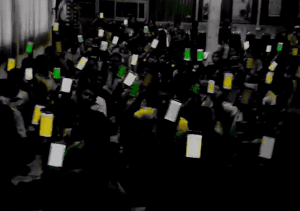[Subject] は [Time] (に) [Means of Transportation] で [Accompanying Person] と [Place] へ/に [行きます/来ます/帰ります]
[Subject] wa [Time] (ni) [Means of Transportation] de [Accompanying Person] to [Place] e/ni [ikimasu / kimasu / kaerimasu]
E.g.,
- 明日、自転車で学校へ行きます (ashita jitensha de gakkou he ikimasu) =Tomorrow, I will go to school by bicycle.
- 彼女は6時に彼とバスで帰りました (ie ni kaeru) =She went back home at 6PM with him by bus.
- へー あの人と行きますか?どこへ? (he- ano hito to ikimasu ka? doko e?) = Eh, You will go with that guy? Where will you go?
- 一人で歩いて来ますか?これは (hitori de aruite kimasu ka? kare wa) = Will he walk here alone?
The 3 Basic Verbs for Traveling
[Time] に
に (ni) indicates a specific point of time when the action takes place. For examples, 7時 (7AM/PM) and 5日 (5th). It is not needed for time with no unspecific point, like 昨 (kinou/yesterday) and 日来週 (raishuu/next week).
[Means of Transportation] で
[Noun] で (de) indicates a means used to take the action. It tells “an instrument used to perform an action” or “how an action is done.” In this context, it is a means of transportable, or a vehicle, e.g., 車で (kuruma de) = by car.
A verb in て-form, which you will later study, works similarly to [Noun]で; it tells how an action takes place. For example, a verb 歩く (aruku) means “walk.” 歩く → 歩いて (aruite) means “by walk.” And 歩いて行く means “go by walk.”
[Accompanying Person] と
[Person] と (to) indicates an accompanying person of the action takes place. For examples, 友達と (tomodachi to) = with my friend, Aさんと (A-san to) = with Mr./Ms. A.
[# of people] で: Note that と indicates “with whom,” not “how many person.” For the number of person, it can be considered as “a means used to do an action,” and thus で is used. For examples, 一人で (hitori de) = by myself alone, みんなで (minna de) = with everyone.
[Place] へ/に
へ (written as “he”, but spelled “e”) is a particle indicating the direction. It is frequently used with these 3 verbs, and rarely used with other verbs.
に (ni) is a particle indicating the destination. When using with other verbs, it means “enter into.”
There are interchangeable for the verbs above.
Learn Vocabulary
https://www.youtube.com/playlist?list=PLB3Mq8bM3diGTsTlV2LrCtxF12bHIwgA8





